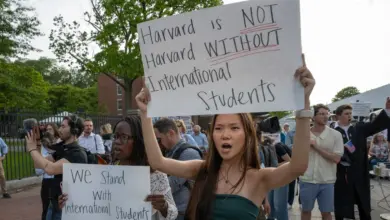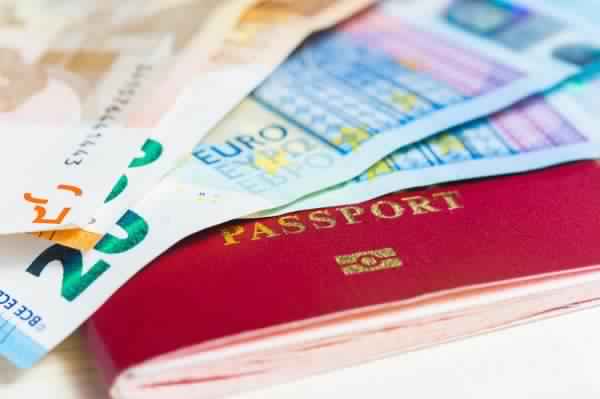The Mugamma has long been a symbol of Egypt’s bloated government bureaucracy, and for foreigners who have endured the long waits and navigated the befuddling sequence of windows to obtain visas there, it has been the subject of many frustrated blog posts and conversations.
But an apparent recent change in enforcement has left some lamenting the time when – however many hours or days it took – many foreigners were free to renew tourist visas without limit.
In recent weeks, members of Egypt’s expat community have complained about being denied the tourism visa extensions they were accustomed to receiving for a pittance. Though those without multiple previous visas have still been able to receive three-month extensions.
Hisham Zaazou, senior assistant to the tourism minister, said the Manpower Ministry is responsible for denying the visa requests as it seeks to crack down on informal employment of foreigners.
Amid a hectic cabinet reshuffle that will usher out many ministers, eight different phone lines at the Manpower Ministry repeatedly went unanswered.
“The Ministry of Manpower has basically highlighted the fact that Egypt is suffering from unemployment, so extending visas for work permits should be within the law, which specifies a 10 percent limit on foreign employees within any company,” Zaazou told Al-Masry Al-Youm.
Foreign hires are also meant to be reserved for specialties in which there is a shortage of qualified Egyptians, such as high-tech jobs, he said.
Those who have entered the country on tourism visas and are now working or studying should respect the law, said Zaazou, who doesn’t believe the stricter enforcement will affect legitimate tourists or tourism revenue.
Even as the ministry tries to reinflate one of the nation’s top four sources of revenue, Zaazou said visa laws should not take into account the money expatriates may inject into the economy.
“We are welcoming tourists to come to Egypt – that's my job, to encourage people coming to Egypt on tourism status – but we're speaking about a totally different kind altogether,” he said.
For those who really are here to tour the country, a three-month visa should be enough, according to Zaazou. And if not, he said, legitimate tourists should be allowed to renew their visas for up to one year.
However, Zaazou repeatedly emphasized that visa policy and enforcement fall under the purview of the Manpower, Foreign and Interior ministries, as well as the National Security Agency.
A Foreign Ministry spokeswoman said she had not heard of the issue.
Despite what seems to be a sudden, unannounced end to unlimited tourist visa renewals, for some it was just a matter of time until Egypt stopped being so lenient.
“Living here for 10 or 20 years on a tourist visas is quite bizarre,” said Nigel J. Hetherington, an archaeologist and media consultant.
The 45-year-old said he did not believe the change would affect tourism.
Hetherington, who has a work visa, said that during a recent trip to the Mugamma he was told foreign residents must have a work permit, be married to an Egyptian, own property or have an excess of US$50,000 in Egyptian banks.
A student visa has also been cited as a valid permit for a long-term stay.
Some foreign residents told Al-Masry Al-Youm they were able to persuade officials to extend their stays despite having prior visas.
Leah Goldberger, 23, received permission for a two-month extension when she spoke to an officer at the Mugamma after initially being turned away because she already had two six-month visas.
“I said I need to stay here because I’m improving my level of Arabic to a level that will allow me to enroll in a university that can grant a student visa,” said Goldberger, who also works for an American market research company.
Rumors have also circulated about potential penalties – ranging from nothing at all to minor fines all the way to deportation – for foreign residents who fail to obtain the proper visa.
When asked about a recent article on news website Bikya Masr, which reported a mid-level tourism official saying the ministry was looking into imposing additional fees for those who overstay their visas, Zaazou said he had never heard of the official or the fine inquiry.
“I’m interested in people coming into the country, but I’m not interested in people changing their status,” Zaazou said. “This has to do with other ministries. … It’s impossible that this request [to look into increasing fines] would come from the ministry. It never did and it never will.”
For now, some foreigners are waiting to see if the policy will outlast the transition government.
Andrew Raven, a 32-year-old freelance journalist, walked out of the Mugamma after being told he could only get a one-month visa extension because he didn’t want a black mark on his file.
“[A police officer] wrote something on my application form in Arabic and I couldn’t read it and I didn’t want that entered into a permanent file if such a thing exists. …That might have been a bit of paranoia on my part,” Raven said.
Raven let his work visa from his previous job expire but has since gotten a job that is providing him with a visa.
“I can understand the Ministry of Manpower, Foreign Affairs, and Tourism not wanting low-skilled workers coming and taking Egyptians’ jobs, but most foreigners I think are a different case. … It doesn’t make sense to kick this revenue source out of the country,” Raven said.
Others who are letting their visas expire plan to pay the roughly LE150 fine at the airport on their way out, or are plotting ways to get around the system.
Travelers who leave with expired visas have typically had no problem obtaining one-month visas at the airport upon their return.




